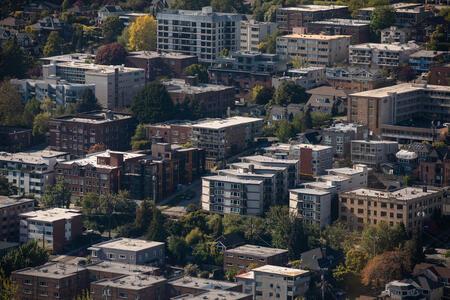At the May 15 meeting of the Washington State Board of Geographic Names, the board decided to formally consider naming the salt waters from Puget Sound to Desolation Sound in British Columbia the Salish Sea. The idea was first proposed in the late 1980s but tabled for lack of support. But things have changed. A quick Google search shows more than 30,000 results and the name is now widely used by scientists, tribes, environmentalists, and travel companies.
The board is under the auspices of the state Department of Natural Resources and this meeting was the first presided over by Washington's new Lands Commissioner, Peter Goldmark. He ran as tight a ship as Captain Cook. The scheduled four-hour meeting was over in less than half that time despite a full agenda; he limited public comment to three minutes. Clearly, being Lands Commissioner during a major recession and running a complex department hit hard by state budget cuts motivated him to not spend too much of his day lingering over the pros and cons of whether to name a small Lewis County creek Cupacoffee.
Nevertheless, Goldmark seemed intrigued by the Salish Sea proposal and remarked that it was hardly a foreign concept in the scientific and policy community. The board unanimously voted to take the next step. It will decide whether or not to adopt the name in October, after further research and soliciting input from experts.
The Salish Sea was put forward by retired Western Washington University professor Bert Webber of Bellingham, a marine ecologist. It was Webber who proposed the name two decades ago, but he revived his effort when a Chemainus tribal elder on Vancouver Island, George Harris, suggested renaming Georgia Strait in British Columbia the Salish Sea in 2008. The idea turned into a hot potato as many in the province resisted the idea of changing the old name. The BC government said it would look into it, but went silent hoping, perhaps, the idea would die. But the dust-up convinced Webber the time was right to push the concept here again, with a major difference: Webber's Salish Sea won't change any of the names of existing waterways (Puget Sound, Georgia Strait, Strait of Juan de Fuca, etc.). It will simply be an overlay. In other words, all those familiar places will simply be components of the larger sea.
For Webber, the Salish Sea is not theoretical. As he says, "Name aside, the thing exists." That thing is a marine ecosystem that is scientifically describable. Naming it accomplishes several things. It gives recognition to term scientists are already using, it honors the original inhabitants of the region — the Coast Salish tribes — and it raises awareness that the region's waterways are interconnected, whether in terms of water flow, the spread of pollutants, or as home to nomadic orcas.
Not everyone is in favor. Speaking against the proposal at the meeting was Christy Hughes of Edison, WA. Hughes has worked for NOAA and the University of Washington; she comes from a commercial fishing family. She worried that the name would create confusion for boaters and require the expensive remaking and replacement of maps and navigational charts. She was also concerned that it could overshadow the rich historic place names left by the Indians, Spaniards, British, Americans — names that reflect the multi-cultural layers of our past. Other skeptics include some who are invested heavily in raising awareness of the Puget Sound "brand" to help boost local clean-up efforts. The new Salish Sea could prove confusing.
Since the name would cross international boundaries, how will the proposal go forward? Webber has also submitted a Salish Sea idea to British Columbia and they are waiting for Washington to act. If the state board rejects the name this fall, the proposal is permanently dead. If it is accepted, however, other dominoes could fall.
In talking to those who have a feel for the process, it could play out like this. If Washington adopts the name, it would then be forwarded to the U.S. government for consideration to be adopted nationally. The U.S. would likely consult with their counterparts in Canada, and British Columbia would likely follow the leanings of those in Ottawa who would be influenced by U.S. opinion and Washington's action. But the bottom line is, here in Washington, if the state board adopts the name in October, any map made in this state showing the affected area would carry the new name, regardless of what anyone else does. In other words, it is possible that we in Washington could refer to parts of Canada as the Salish Sea even if our British Columbian neighbors do not.
It would be ironic if there wound up being a divided opinion over a name intended to rise above borders and raise awareness about our eco-connections. But then, no one said the Salish Sea is easy to navigate.



